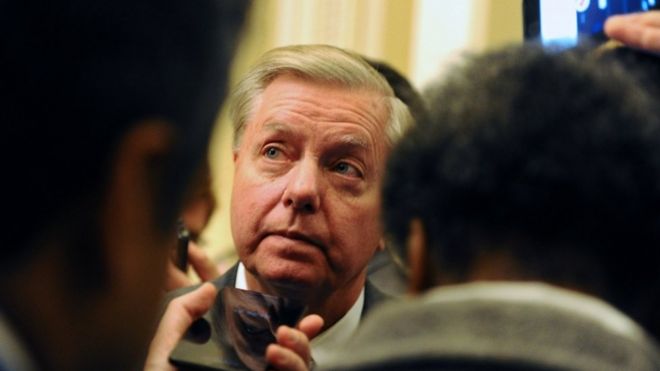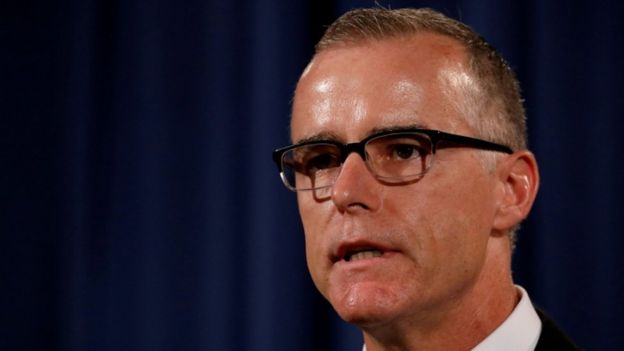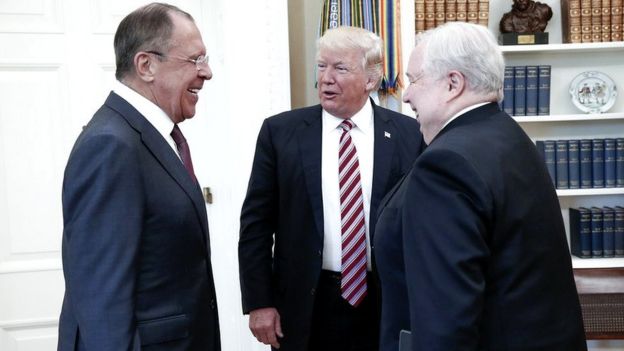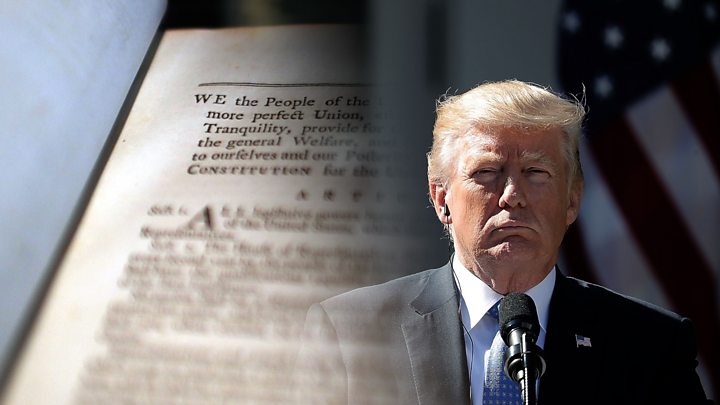 REUTERS
REUTERS
The chairman of the US Senate Judiciary Committee has vowed to get to the bottom of allegations that discussions were held in 2017 on removing President Donald Trump from office.
Senator Lindsey Graham pledged to issue subpoenas "if that's what it takes".
Ex-acting FBI chief Andrew McCabe has said deputy US attorney general Rod Rosenstein discussed the numbers needed to invoke the 25th Amendment.
Mr Rosenstein has in the past denied discussing invoking the clause.
The 25th Amendment provides for the removal of a president if deemed unfit.
Mr Graham's pledge comes after Mr McCabe appeared on the 60 Minutes show on CBS in the US on Sunday.
In the interview, Mr McCabe also said that:
- The FBI "had reason to investigate" the president's links with Russia, based on Mr Trump's actions
- Mr Rosenstein had been "absolutely serious" when he discussed secretly wearing a wire to record Mr Trump
- Mr Trump said Russian President Vladimir Putin had told him North Korea did not have the capability to hit the US with ballistic missiles - and, when US intelligence officials contradicted this assessment, responded with: "I don't care. I believe Putin."
The White House said Mr McCabe, who was fired last year for allegedly lying to government investigators, had "no credibility".
What are the 25th Amendment claims?
The allegations that Mr Rosenstein discussed invoking the amendment to oust Mr Trump were first reported last year by the New York Times, which cited anonymous sources.
However, Mr McCabe's quotes are the first to be made on the record from someone present at the meeting where the alleged comments were reportedly made.
Mr McCabe said Mr Rosenstein had made the remarks in May 2017, after Mr Trump fired FBI director James Comey.
 REUTERS
REUTERS
"The discussion of the 25th Amendment was simply [that] Rod raised the issue and discussed it with me in the context of thinking about how many other cabinet officials might support such an effort," Mr McCabe said.
He said that Mr Rosenstein was openly "counting votes, or possible votes".
"The deputy attorney general was definitely very concerned about the president, about his capacity and about his intent at that point in time."
"To be fair, it was an unbelievably stressful time... it was really something that he kind of threw out in a very frenzied chaotic conversation about where we were and what we needed to do next."
Mr Rosenstein has previously strongly denied discussing invoking the constitutional clause to oust Mr Trump, saying there was "no basis" to invoking the amendment.
However, Senator Graham said using the 25th Amendment would have amounted to "an administrative coup".
"It's stunning to me that one of the chief law enforcement officers of the land would go on national television and say, oh by the way I remember a conversation with the deputy attorney general about trying to find if we could replace the president under the 25th Amendment," Mr Graham told CBS.
"I think everybody in the country needs to know if it happened. I'm going to do everything I can to get to the bottom of Department of Justice [and] FBI behaviour toward President Trump and his campaign."
He pledged to hold a hearing to determine "who's telling the truth".
What is the claim about secret recordings?
Mr Rosenstein is also alleged to have offered to secretly record Mr Trump, amid concerns about possible obstruction of justice relating to the investigation into alleged collusion between the president's campaign team and Russia.
When the allegations first emerged in the New York Times, Mr Rosenstein said the report was "inaccurate and factually incorrect".
A source told us at the BBC at the time that Mr Rosenstein's comment "was sarcastic and was never discussed with any intention of recording a conversation with the president".
However, Mr McCabe said that Mr Rosenstein "was not joking. He was absolutely serious".
"It was incredibly turbulent, incredibly stressful. And it was clear to me that that stress was — was impacting the deputy attorney general.
"We talked about why the president had insisted on firing [Comey] and whether or not he was thinking about the Russia investigation. And in the context of that conversation, the deputy attorney general offered to wear a wire into the White House."
"I never actually considered taking him up on the offer," he added.
What did McCabe say about the Russia inquiry?
Mr McCabe said the FBI was right to investigate Mr Trump's ties to Russia.
When Mr Trump had told journalists and Russian diplomats that the Russia inquiry was among the reasons he had fired Mr Comey, his comments indicated that "a crime may have been committed", he said.
"If the president committed obstruction of justice, fired the director of the FBI to negatively impact or to shut down our investigation of Russia's malign actively - possibly in support of his campaign... you have to ask yourself: Why would a president of the United States do that?"
"The FBI had reason to investigate that... the existence of an investigation doesn't mean someone is guilty," he said.
 EPA
EPA
Mr McCabe said he was "very concerned" about the Russia case, and wanted to ensure that "were I removed quickly and reassigned or fired, that the case could not be closed or vanish in the night without a trace".
What has the response been?
The Justice Department says that Mr McCabe's account is "inaccurate and factually incorrect."
"The deputy attorney general never authorised any recording [of Mr Trump]... nor was the deputy attorney general in a position to consider invoking the 25th Amendment."
In January, US media reported that Mr Rosenstein was planning to quit, although no timeframe had been set.
Meanwhile, the White House said: "Andrew McCabe was fired in disgrace from the FBI for lying, and he opened a completely baseless investigation into the president - everyone knows he has no credibility."
Mr McCabe, who took over the FBI in 2017, was himself fired as deputy director in March last year just two days before he was due to retire.
He was sacked by US Attorney General Jeff Sessions, who said an internal review found he leaked information and misled investigators.
Mr McCabe denied the claims and said he was being targeted because of his involvement in the inquiry into alleged Russian meddling in the 2016 election.
He has now written a book on his time in the post.

What is the 25th Amendment?
It provides for the removal of a president if he is deemed unfit for office. Duties are transferred to the vice-president.
Activating the relevant section of the 25th Amendment would require the approval of eight of the 15 members of Mr Trump's cabinet, the vice-president and two-thirds majorities in Congress.
Ronald Reagan and George W Bush used the amendment to temporarily transfer power when they were medically anaesthetised.

US & Canada
Smollett 'had no role in own attack'
- 17 February 2019
- US & Canada
Firefighters 'rescue' lion from tree
- 17 February 2019
- US & Canada
Ex-Fox star withdraws bid for UN role
- 17 February 2019
- US & Canada











No comments:
Post a Comment